Well, I can certainly see why they call this one a problem play. The main problem we had with it was why on *earth* Helena would be in love with Bertram. At his best, he’s a sulky and somewhat dim teenage boy, and at his worst he is an utter cad. In any other Shakespeare play, he would be called Claudio.
Normally, we do Shakespeare in the afternoon, and I have basically everything on the table at once, but given that this was an evening meal, I decided that it would be nice to organise multiple courses, coming before and between acts. Also, I was worried that there wouldn’t be enough food, because even though I treat Shakespeare afternoon teas as though they are lunch, dinner is different, and you have to make sure people are properly fed. It would be terrible if people went hungry… So we had our pizza course before Act 1, our pasta course before Act 2, our meat course towards the end of Act 3, and our sweets during Act 5.
(also, the photos are not particularly good this time, because I had had very little sleep the night before and was rather tired and disorganised, so I kept forgetting to take photos until it was too late)
As for the plot… it was very much Shakespeare Comedy Bingo. Allegedly intelligent and resourceful heroine has spectacularly awful taste in men? Check! Person tricked into marriage? Check! Heroine disguises herself (though not as a boy, this time)? Check! Heroine fakes her own death? Check! Unappreciated wife exchanges places with Virtuous Virgin to trick her husband into sleeping with her? Check! Husband apparently can’t tell women apart in the dark? Check! Lots of puns about oral sex for no reason at all? Check! (Admittedly, it didn’t take long for us to start finding dirty jokes where Shakespeare probably didn’t intend them, but to be fair, I’m sure we missed several he meant us to notice, so on balance, we probably made it about as filthy as Shakespeare intended.) (Oh dear. I hope you weren’t under the impression that Shakespeare wrote high-minded literature? Because if so, I regret to inform you that while he certainly could do that, he also spent a lot of time writing to the lowest common denominator. Which would be us.)
All it lacked was a set of identical twins.
For those who don’t know this play, the short version is: Helena, the virtuous daughter of a doctor, is an orphan in the wardship of the Countess of Rossilon, and in love with the Countess’s son, Bertram. Using knowledge gained from her father, she cures the King of a fatal illness, and gains Bertram’s hand in marriage as a reward. Bertram is appalled, refuses to sleep with her, and runs away to the wars, telling her that he won’t consider her his wife until she gets the ring from his finger and is carrying his child. Helena disguises herself as a pilgrim and follows him to Florence, and befriends the virtuous Diana, who Bertram is trying to seduce. The two women exchange places in the dark, so that Bertram sleeps with Helena and gets his ring.
All is eventually revealed, and in addition, Bertram gets the living daylights scared out of him by the King, and so he agrees to be a proper husband to Helena, and, hard as this may be to believe, everyone lives happily ever after, with the exception of Bertram’s follower, Parolles, who is exposed for the braggart he is in a sub-plot involving an invented language of extreme silliness.
We all spent most of the play wondering aloud why Helena a) didn’t marry Second Gentleman instead and b) why she thought that any of this was a good idea. My theory was that she knew she was in a Shakespeare play, and therefore realised that if she played by the rules (got up a disguise, faked her death, planned a bed-trick) she couldn’t possibly lose. But her fondness for Bertram remains a mystery to all of us.
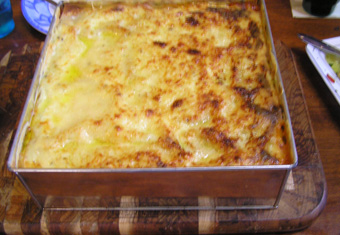
Scarily large lasagne. I actually followed a recipe (which I never do when making lasagne), which claimed that this would serve eight people. Presumably, the writer meant eight people who have just run a marathon and haven't eaten in several days...
But what about the food? My original thought with this was Florence = Florentines, and I couldn’t resist those in the end. Nor could I resist canneloni with spinach and ricotta (spinach, of course, being the other culinary Florentine). And after all the remarks about aged virginity being like maggoty cheese (mmm… tasty), cheese was clearly a necessity. And given all the other dirty jokes, it was sort of irresistible to make a gelato out of apricots (which used to go by the name of apricocks), though the dirty jokes about those are actually found in Richard II.
On the whole, though, my theme was Italian food for the last of the Italian plays. And in keeping with this, I decided to start with proper pizza, which to me will always be the puffy, slightly chewy, thick flatbread topped with either oregano or passata, and not much (if anything) else. This is pizza as my Nonna used to make it, and I followed her recipe as best I could and did, in fact, get pretty close to what she used to make. Not quite chewy enough, but the texture was good and the flavour was right (though I overdid the salt a bit in the tomato pizza).
I’m not sure if this is a Southern Italian thing, or just a Basilicata thing, but this really is what I think of when people say pizza. This is also the reason I really don’t like ordering commercial pizzas – they are too greasy, too flat, and have too many toppings. I’ll occasionally make this style of pizza myself, but I control the toppings fairly carefully, and I always end up letting the pizza rise a second time because I just can’t bring myself to make a really flat pizza.
Anyway, it was quite amusing seeing some people’s puzzled reactions to a pizza that was really more like a bread and was served at room temperature (and yes, I fully intend to post the recipe for this in a few days, but I need to make it again first, and take more photos of the process, and get the texture a bit closer to what I remember). You generally eat this sort of pizza warm or at room temperature, and can either have it just as it is, or with a bit of cheese or a few marinated vegetables on the side. I went with the latter option, since it was my first course.
Our pasta course was also fairly traditional – spinach and ricotta canneloni (which in my family is made with pancakes instead of pasta – I think this started from the Austrian side, and then infected the Italian side, but no matter), and vegetable lasagne (meat lasagne is more traditional, but it’s also heavier, and I was trying to be merciful). And a green salad with mixed lettuces, cucumber, spring onions and herbs, to cut the richness of all the cheesy cheesy goodness.
At this point, I probably could have called it a day and moved on to dessert, but this is not the Italian way! I’d found this lovely recipe in Cook Simple for chicken cut into pieces and roasted very simply with baby potatoes, two bulbs of garlic, onion, rosemary, salt, olive oil and a little balsamic vinegar. Absolutely lovely, but it was probably not actually necessary to buy two whole chickens for this. Even if they were gorgeous free-range ones. (But… the chicken is cut into 8 pieces and there are 11 people! What if there isn’t enough food?!)
And, of course, you can’t have a meat course without more salads – I made my all-time favourite summer salad of tomatoes, peaches, nectarines and basil dressed with lemon juice and blood orange-infused olive oil, as well as a salad of rocket, carrot, radish and shaved parmesan.
This may have been a course too far, but I have no regrets. And all that leftover chicken and potato and garlic and rocket and carrots made a delicious pie for dinner last night. (Why yes, we are living in the land of leftovers, and at the current rate of progress, I don’t anticipate needing to buy food until Tuesday evening at the earliest…)
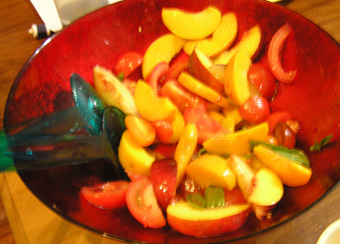
Truly beautiful tomato and peach salad - at low tide, because I forgot to photograph this until after we'd all had some.
Then, of course, there was dessert. At which I may, just possibly, have gone overboard. We had the aforementioned apricot gelato, of course. It was a little on the insipid side when I started to churn it, so I added a little orange-flower water which made it amazing (if, perhaps, a trifle inauthentic).
We had a ricotta cheesecake, flavoured with marsala, candied orange peel and chocolate. We had balsamic strawberries, along with mascarpone and grated chocolate. We had florentines, which were necessary, and ginger biscuits and semolina shortbread, which probably were not. We had blue cheese to go with the ginger biscuits, but nobody seemed game to try that this time around. That, or they had had enough cheese already.
Oh, and we had lemon cake. To help cut the richness, along with the strawberries. I thought about fresh fruit as well, but decided there might possibly be enough on the table already…
And we finished the play. Which was fun, despite the deranged plot and Helena’s inexplicable fascination with the unworthy Bertram (seriously, tricking someone into marrying you is a terribly bad idea, no matter how sweet and submissive and virtuous you are afterward. But the sort of person who goes around trying to seduce virgins and making false promises of marriage probably deserves what he gets.). Also, we were amused that First Lord and Second Lord managed to be quite significant roles, despite never really getting names. And as for Parolles, we couldn’t help wondering if he might possibly have turned out better if every single person he met wasn’t instantly convinced that he was a braggart and a bad influence (also, how could he possibly be a bad influence on Bertram? Bertram was going to the bad all by himself and without any help from anyone.).
And that’s that. Only four plays left – and the next up is Coriolanus, which does not look to be inspiring. But I think I may have reached my over-catering peak this time around… I suspect, in fact, that I was channelling Nonna, as people kept apologising for not eating all the food…

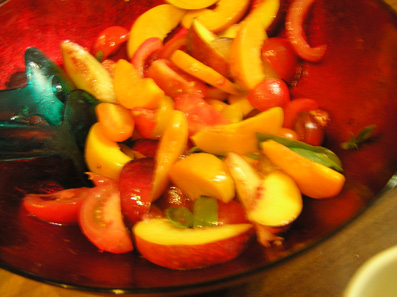
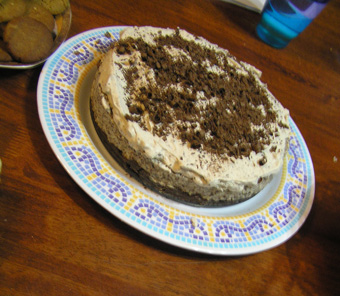
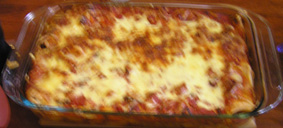
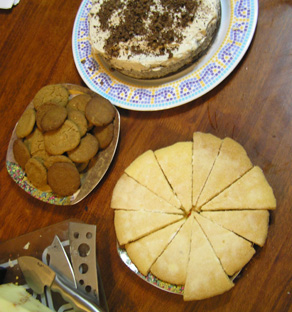
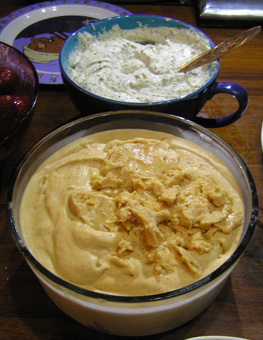
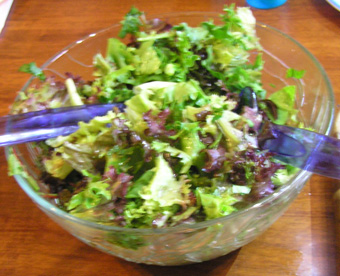
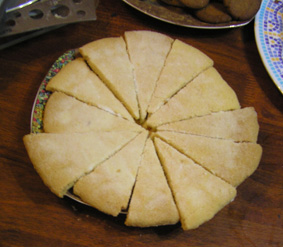
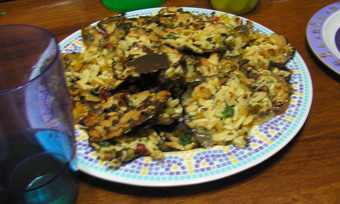

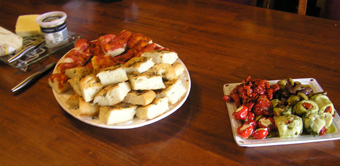


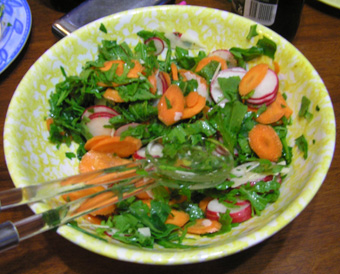


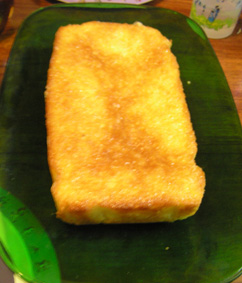
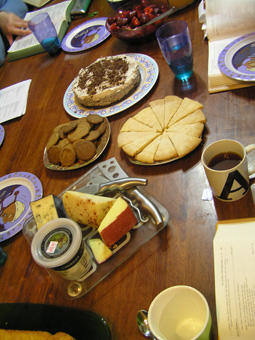
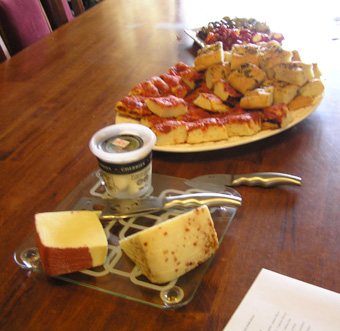
4 comments for “Shakespeare Feast: All’s Well That Ends Well”